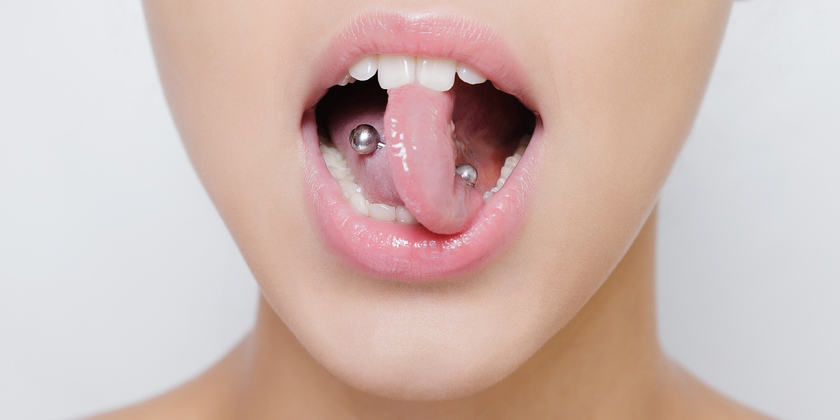People enjoy expressing themselves through piercings and body art, and one of the most popular ways to do so is through tongue piercing rings. However, many dentists don’t recommend them, as they can cause a number of oral problems.
How Tongue Rings Work
These rings are usually inserted into the tongue through its lingual frenulum. It is the thin membrane which attaches the tongue to the mouth bed, and the most popular variant is the stud, which can come in various patterns, materials and colors.
Why Dentists Are Concerned About Them
Many of the people who receive these piercings rarely remove them. This is due to the fact that after the piercing has been made the tongue heals rapidly and will close itself should the space not be maintained. The continual pressure that is made by the piercing along the back teeth will eventually cause them to loosen and begin shifting, which can result in gaps, a phenomenon which is referred to as diastema.
Another problem is the ease with which the tongue piercing can bump up against the teeth while eating and talking, and over time this can chip away the tooth enamel, which leaves the sensitive dentin layers exposed. Some with piercings have accidentally bitten down hard enough to produce enamel cracks that influenced the nerves, requiring them to get a root canal.
The final issue is that of bacteria. In the first few weeks after the procedure has been completed, those who receive piercings are highly susceptible to infection, and secondary infections can also occur which can in turn lead to other illnesses, such as herpes, angina or even hepatitis.
How To Prevent These Issues
Many dentists will recommend not getting your tongue pierced in the first place; but for those who already have, or who insist on getting one, there are a number of things they can do to prevent complications from occurring. First, know which types of jewelry are adequate for these types of piercings. Experts recommend longer items so that the jewelry isn’t swallowed up by the swelling. After your tongue becomes adjusted to the longer piercing you can then switch to smaller ones.
When selecting piercings made from metal, verify that it is surgical grade. Standards have been established, and there are places online where you can read them. Additionally, tongue barbells which are constructed with polymer are the best since it lowers tooth damage risk. For your tongue’s underside, it is also recommended to get a ball which is smaller; so that contact with the mouth’s sublingual area is minimized.
If you’re going to get a piercing, you will need to take care of it. Clean your mouth daily, after each meal, especially within the first few weeks after undergoing the procedure. Do not use your tongue or hands to play around with the piercing, as it can cause damage to the gums or teeth.


